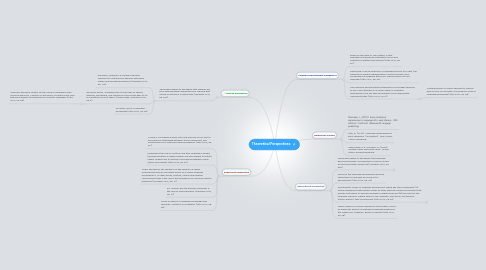
1. Nativist Perspective
1.1. Those who adhere to the theory that children are born with biological dispositions for learning that unfold or mature in a natural way (Machado 2010, Pg. 647).
1.1.1. Rousseau, Pestalozzi & Froebel classified children into maturational theories with ages, stages and normative behaviors (Machado 2010, Pg. 174).
1.1.2. Rousseau wrote, "Childhood has its own way of seeing, thinking, and feeling, and nothing is more foolish than to try to substitute ours for theirs" (Hirsh-Pasek, Golinkoff 2004, Pg. 5).
1.1.2.1. Chomsky devised a system for the using of language called universal grammar, a system of principles, conditions and rules that are elements or properties of all human languages (Otto 2010, Pg. 28).
1.1.3. Syntactic focus of language knowledge (Otto 2010, Pg. 28).
2. Behaviorist Perspective
2.1. A child is considered a blank slate and learning occurs due to associations established between stimuli, responses, and events that occur after the response behavior (Otto 2010, Pg. 30).
2.2. Emphasizes the role of "nurture" and thus language is taught through situations in which children are encouraged to imitate others' speech and to develop associations between verbal stimuli and objects (Otto 2010, Pg. 30).
2.3. Under this theory, the reactions of the people in a child's environment have an important effect on a child's language development. In other words, positive, neutral and negitive reinforcement play a key role in the emergence of communicational behaviors (Machado 2010, Pg. 12).
2.4. B.F. Skinner was the pioneer researcher in the field of learning theory (Machado 2010, Pg. 12).
2.5. Focus on aspect of language knowledge was semantic, syntactic & morphemic (Otto 2010, Pg. 28).
3. Cognitive Development Perspective
3.1. Based on the work of Jean Piaget, in that language is acquired as maturation occurs and cognitive competencies develop (Otto 2010, Pg. 30).
3.2. Piaget had a narrow definition of language that for it to exist, the capacity for mental representation must be present, thus vocalizations & babbling that occur during infancy are not language (Otto 2010, Pg. 30).
3.3. The cognitive developmental perspective encourages teachers to pay close attention to a child's stage of cognitive development and use that knowledge to plan appropriate leaning activities (Otto 2010, Pg. 31).
3.3.1. Centered belief of nature opposed to nurture with a focus on semantic & morphemic areas of language knowledge (Otto 2010, Pg. 28).
4. Interactionist Perspective
4.1. Those who adhere to the theory that language develops through a combination of inborn factors and environmental influences (Machado 2010, Pg. 646).
4.1.1. INS to insert (Windows)
4.1.2. TAB to insert (Mac OS)
4.1.3. ENTER to add siblings
4.1.4. DEL to delete
4.1.5. Press F1 to see all key shortcuts
4.2. Focus on the language development process rather than on language as a product of development (Otto 2010, Pg. 33).
4.3. Intentionality model of language development which has two components: (a) active engagement with others as well as other aspects of their environment that provide motivation to develop language competencies and (b) the effort of the language learner in making sense of the "linguistic, emotional, and physical actions present their environment (Otto 2010, Pg. 33).
4.3.1. Online Help
4.3.2. Use Cases & Templates
4.3.2.1. Personal Todo List
4.3.2.2. Vacation Planning
4.3.2.3. Meeting Minutes
4.3.2.4. Project Plan
4.3.2.5. more...
4.3.3. Tools and Gadgets
4.3.3.1. Offline Mode
4.3.3.2. Geistesblitz Tools
4.3.3.3. Email & SMS Gateways
4.3.3.4. Offline Mode
